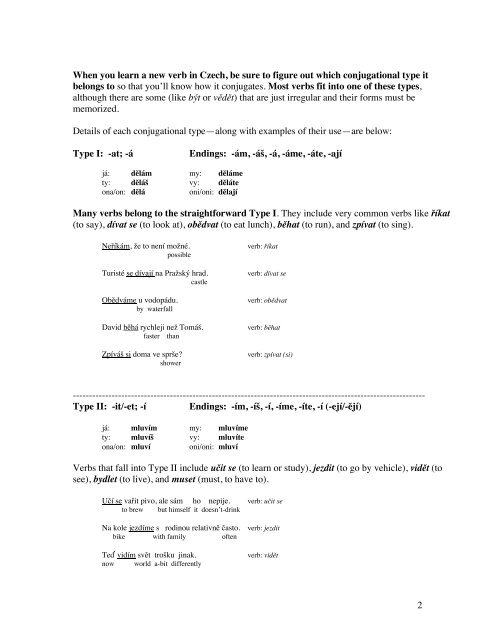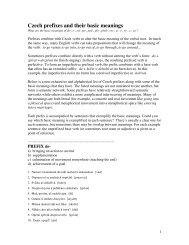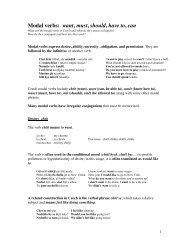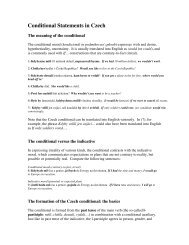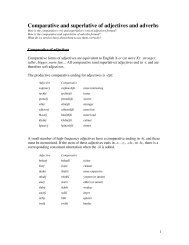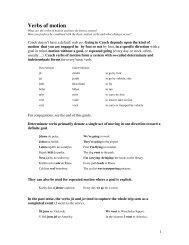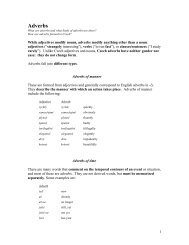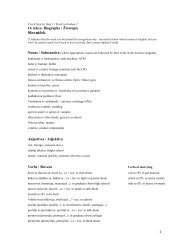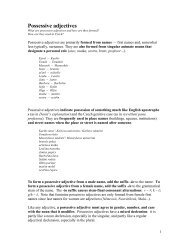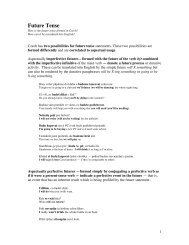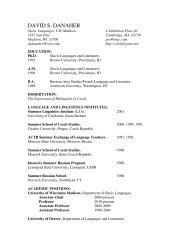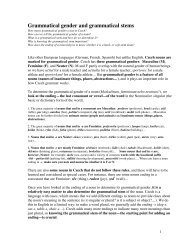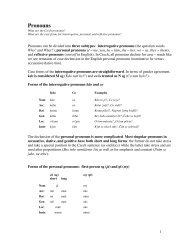Verbs: the present tense - Cokdybysme.net
Verbs: the present tense - Cokdybysme.net
Verbs: the present tense - Cokdybysme.net
You also want an ePaper? Increase the reach of your titles
YUMPU automatically turns print PDFs into web optimized ePapers that Google loves.
When you learn a new verb in Czech, be sure to figure out which conjugational type it<br />
belongs to so that you’ll know how it conjugates. Most verbs fit into one of <strong>the</strong>se types,<br />
although <strong>the</strong>re are some (like být or vědět) that are just irregular and <strong>the</strong>ir forms must be<br />
memorized.<br />
Details of each conjugational type—along with examples of <strong>the</strong>ir use—are below:<br />
Type I: -at; -á<br />
Endings: -ám, -áš, -á, -áme, -áte, -ají<br />
já: dělám my: děláme<br />
ty: děláš vy: děláte<br />
ona/on: dělá<br />
oni/oni: dělají<br />
Many verbs belong to <strong>the</strong> straightforward Type I. They include very common verbs like říkat<br />
(to say), dívat se (to look at), obědvat (to eat lunch), běhat (to run), and zpívat (to sing).<br />
Neříkám, že to není možné.<br />
possible<br />
Turisté se dívají na Pražský hrad.<br />
castle<br />
Obědváme u vodopádu.<br />
by waterfall<br />
David běhá rychleji než Tomáš.<br />
faster than<br />
Zpíváš si doma ve sprše<br />
shower<br />
verb: říkat<br />
verb: dívat se<br />
verb: obědvat<br />
verb: běhat<br />
verb: zpívat (si)<br />
-------------------------------------------------------------------------------------------------------------<br />
Type II: -it/-et; -í Endings: -ím, -íš, -í, -íme, -íte, -í (-ejí/-ějí)<br />
já: mluvím my: mluvíme<br />
ty: mluvíš vy: mluvíte<br />
ona/on: mluví oni/oni: mluví<br />
<strong>Verbs</strong> that fall into Type II include učit se (to learn or study), jezdit (to go by vehicle), vidět (to<br />
see), bydlet (to live), and muset (must, to have to).<br />
Učí se vařit pivo, ale sám ho nepije. verb: učit se<br />
to brew but himself it doesn’t-drink<br />
Na kole jezdíme s rodinou relativně často.<br />
bike with family often<br />
Teď vidím svět trošku jinak.<br />
now world a-bit differently<br />
verb: jezdit<br />
verb: vidět<br />
2


